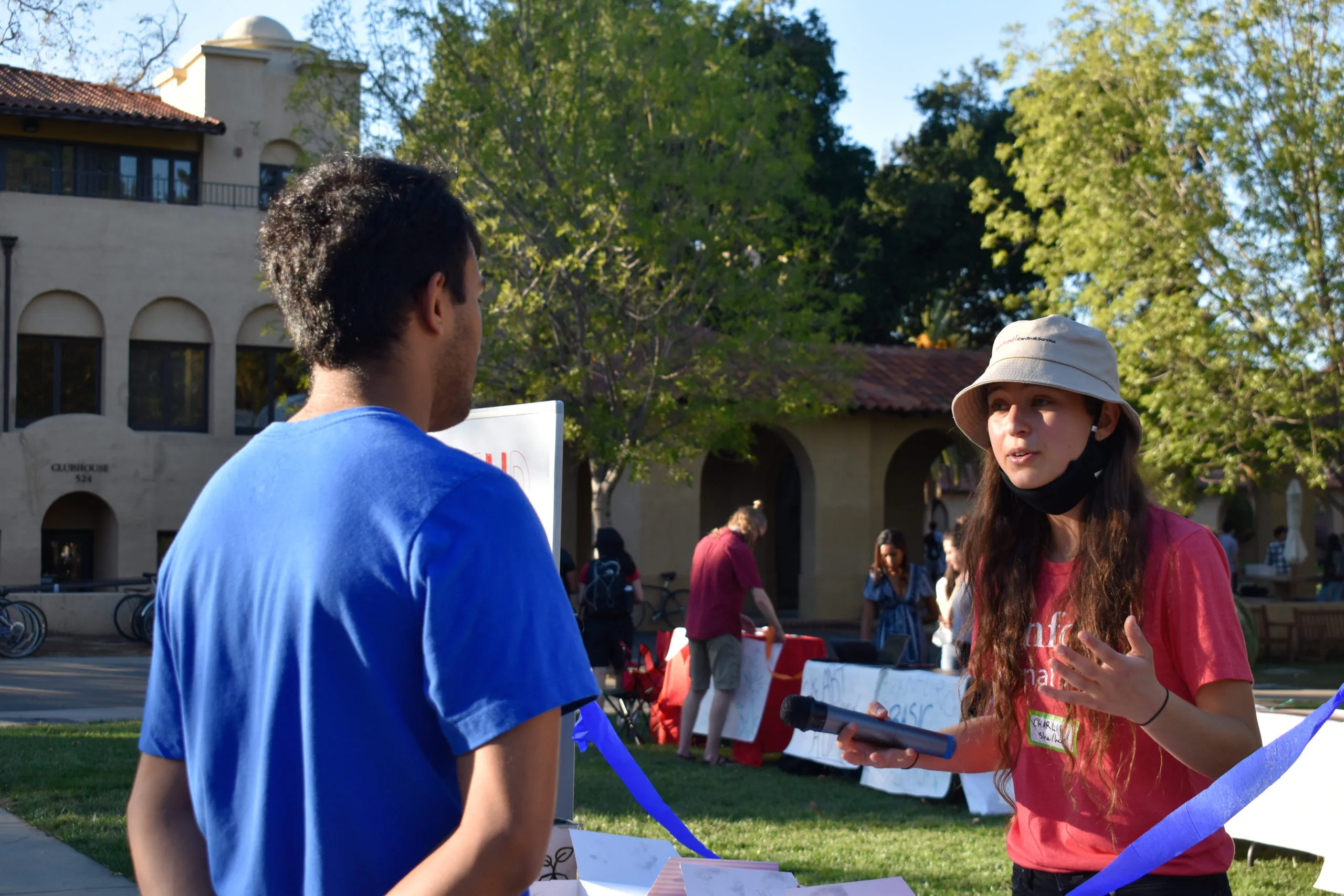A coalition of student groups organizing around mutual aid, sustainability, advocacy and workers’ rights called for greater awareness of food and housing insecurity at Stanford and across college campuses nationwide during a Friday event at White Plaza Lawn.
The event was organized by Charlie Hoffs ’22, who serves as the Haas Center Affordability Issue Area Coordinator — a role created as part of a new Haas Center initiative to promote community partnerships and collective action to target pressing issues on campus. Hoffs cited student advocacy during the pandemic as inspiration for her own efforts.
“To watch in this incredibly vulnerable, terrifying time for our country or state or campus community, people rising up and putting everything on the line to support, through mutual aid, other Stanford students — it was transformative,” she said.
Groups in attendance included Stanford Basic Needs, Stanford Food Recovery, Stanford Pop-Up Food Pantry, Students for Workers’ Rights, Students for Environmental and Racial Justice, Stanford Housing Justice, Students for a Sustainable Stanford, unBox, Rethinking Economics, Stanford Young Democratic Socialists of America, the Graduate Student Council (GSC), Stanford Basic Needs and Heart and Home.
During the event, Stanford Students for Workers’ Rights advocated for the basic needs of service workers. In light of turnover in the workforce due to COVID-19, mass layoffs and people moving out of the area, Arushi Gupta ’23, who tabled for the group, said that a large part of the organization’s work is trying to reground and rebuild its relationships with workers. Working with community partners — including graduate and undergraduate groups, local and state-wide unions and community organizations like Working Partnerships — is vital to that work, she added.
“In our work, service workers face housing insecurity, food insecurity and other basic needs issues, and we’re here because we want to change that,” Gupta said.
Aylee Wu ’25, a member of Stanford Food Recovery, said that she attended the event because she cares deeply about solving issues related to hunger in the local area. For Wu, access to food and education are crucial to one’s livelihood.
Stanford Food Recovery is a student group that is dedicated to reducing food waste on Stanford’s campus and redistributing it to food-insecure communities in the Bay Area. One of the group’s efforts is Dining Hall Pickups, where volunteers pick up unused food and redistribute it to people in the Bay Area in coordination with head chefs and a program called A La Carte, according to Wu.
Hoffs hoped an event that brought together student groups would activate community dialogue and collaboration, as well as encourage community members passing by to engage with issues of campus hunger and homelessness. And this is exactly what happened. Though the event was mainly attended by members of different student groups, many students biking or walking near White Plaza found themselves exploring the various tables and learning about issues that affect the Stanford community and beyond.
Janene Kim ’25 and Lily Forman ’25 were two of these students.
During the event, Forman said that she learned about how difficult it is for college students to secure food stamps due to a work requirement that many students cannot fulfill. She recalled an attendee telling her that “their low-income friends are thinking about dropping out so they can get on food stamps.” Throughout the event, Hoffs highlighted the importance of the Enhance Access to SNAP Act of 2021, which would treat attendance at an institution of higher education as fulfilling the work requirement to be eligible for the supplemental nutrition assistance program.
Kim also emphasized how much she learned from being in a space with the advocates.
“We learned a lot of really interesting statistics that I don’t think most college students know — for example, 17% of college students face homelessness,” she said. “We also learned about ways we personally can affect change.”
A Linktree publicized at the event consolidated many of these options for student engagement, including ways to take policy action, ways to support the Stanford community and volunteer opportunities with both local and nation-wide groups.
Hoffs emphasized the importance of students and community members continuing to voice their needs to the Stanford administration, as “nobody knows what students’ basic needs are better than students themselves,” she said.
After students have spoken out about their needs and lived experiences, Hoff said “transformative improvements have been made with [Residential and Dining Enterprises (R&DE)], with Stanford at large, showing up better for students.” She cited the Stanford Food Pantry Pop Up, which supports over 400 graduate students and postdoctoral students each month, as an example of R&DE’s responsiveness to student concerns.
“I think that when campus gets loud, the institution listens and will support us so I guess my thought on this is — when you have a concern, let’s rally and let’s elevate this issue up to those who will listen,” she said.
